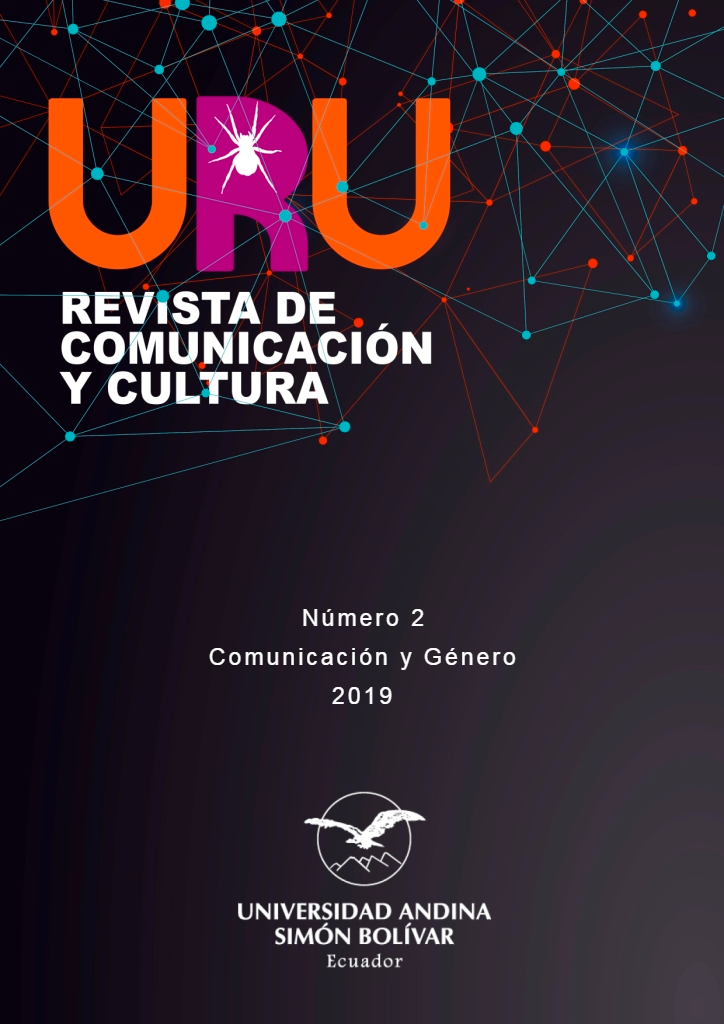Analysis of the social representation of women in Peruvian television news
Keywords:
Media representation, gender studies, tv journalism, infotainment.Abstract
This study analyzes the social representation that is assigned to the figure of women in Peruvian news programs that fall into the commercial formulas of infotainment. These constructions use the typical elements of melodrama, as their argument and the construction of their characters, replicating some vices of the genre, such as stereotypes, which in the region end up negatively affecting the perception of women in the society. Through the analysis of the case of Rosario Ponce, one of the most salient cases in the recient history of Peruvian news for its media impact, we find that fictional creation and gender violence are easy and effective resources of infotainment.
Downloads
References
Berrocal, S., Redondo, M., Martín, V. y Campos, E. (2014). La presencia del infoentretenimiento en los canales generalistas de la TDT española. Revista Latina de Comunicación Social, 69, 85-103. doi: 10.4185/RLCS-2014-1002
Blanco-Cano, R. (2017). ¿Nuevas masculinidades en la televisión mexicana contemporánea? El sexo débil (2011). Estudios de Género de El Colegio de México, 3(6), 101-126. doi: 10.24201/eg.v3i6.84
Carrillo, N. (2013). El género-tendencia del infoentretenimiento: definición, características y vías de estudio. En C. Ferré (Ed.), Infoentretenimiento. El formato imparable de la era del espectáculo (pp. 33-58). Barcelona, España: UOC.
Consejo Consultivo de Radio y Televisión. (2018). Estudio sobre Consumo Televisivo y Radial 2017. Recuperado de http://www.concortv.gob.pe/investigacion/estudios-cuantitativos/2017-estudio-sobre-consumo-televisivo-y-radial/
Cruzado, A. (2004). El mal tiene nombre de mujer: del Olimpo a la Meca del cine. En M. Arriaga (Coord.), En el Espejo de la Cultura: Mujeres e Iconos
Femeninos (pp. 31-46). Sevilla, España: Arcibel Editores. Recuperado de https://books.google.com.pe/books?id=FzeFhIQYf1EC&lpg=PA3&hl=es&pg=PP1#v=onepage&q&f=false
Esteban, M., Medina, R. y Távora, A. (2005). ¿Por qué analizar el amor? Nuevas posibilidades para el estudio de las desigualdades de género. En C. Díez y C.
Gregorio (Coordinadores). Cambios culturales y desigualdades de género en el marco local-global actual. Conferencia llevada a cabo en el X Congreso de Antropología en Sevilla, España. Recuperado de http://digibug.ugr.es/bitstream/handle/10481/22464/por%20qu%C3%A9%20analizar%20el%20amor.pdf?sequence=1&isAllowed=y Federación de Periodistas pide ética en las informaciones del niño Gabriel (2018, marzo 12). Recuperado de https://www.lavanguardia.com/vida/20180312/441485959317/federacionde- periodistas-pide-etica-en-las-informaciones-del-nino-gabriel.html
Ferrer, V. y Bosch, E. (2013). Del amor romántico a la violencia de género. Para una coeducación emocional en la agenda educativa. Profesorado. Revista de currículum y formación del profesorado, 17(1), 105-122. Recuperado de http://www.ugr.es/~recfpro/rev171ART7.pdf
Fuller, N. (1996). "En torno a la polaridad machismo-marianismo". Recuperado de: https://institucional.us.es/revistas/warmi/7/2.pdf
García, J. (2007). El infoentretenimiento en los informativos líderes de audiencia en la Unión Europea. Anàlisi: cuadernos de comunicación y cultura, 35, 47-63. Recuperado de https://core.ac.uk/download/pdf/13271691.pdf
Gayá, C. (2013). La era del espectáculo: de la información al show. En C. Ferré (Ed.), Infoentretenimiento. El formato imparable de la era del espectáculo (pp. 11-33). Barcelona, España: UOC.
Gonzales, M. (10 de noviembre de 2012). La doble sentencia a Eva Bracamonte y Rosario Ponce. La República. Recuperado de https://larepublica.pe/archivo/672990-la-doble-sentencia-a-evabracamonte-y-rosario-ponce
Hidalgo, R. (2003). La Medea de Eurípedes. Hacia un psicoanálisis de la agresión femenina y la autonomía. Revista Subjetividad y Cultura, 19, 1-18.
Recuperado de http://subjetividadycultura.org.mx/la-medea-de-euripideshacia-un-psicoanalisis-de-la-agresion-femenina-y-la-autonomia/
Lagarde, M. (1997). Claves feministas para el poderío y la autoafirmación de las mujeres. Managua, Nicaragua: Puntos de Encuentro. Recuperado de http://www.caladona.org/grups/uploads/2013/04/claves-feministasparael-poderio-y-autonomia_mlagarde.pdf
Martín-Barbero, J. (1993). De los medios a las mediaciones. Comunicación, cultura y hegemonía. Gustavo Gili Editores. México.
Martín-Barbero, J. (1992). Televisión y melodrama. Géneros y lecturas de la telenovela en Colombia. Recuperado de: http://pdfhumanidades.com/sites/default/files/apuntes/25%20-%20martin%20barbero%20Television%20y%20melodrama.pdf
Mulvey, L. (1999) Visual Pleasure and Narrative Cinema. En L. Braudy y M. Cohen (ed.), Film Theory and Criticism: Introductory Readings (pp. 833-844). New York, Estados Unidos: Oxford UP. Recuperado de http://www.composingdigitalmedia.org/f15_mca/mca_reads/mulvey.pdf
Ortells Badenes, S. (2011). La consolidación de los programas de infoentretenimiento en el panorama televisivo español. Fòrum de recerca, 16, 279-292. Recuperado de http://repositori.uji.es/xmlui/bitstream/handle/10234/77227/fr_2011_21.pdf sequence=1&isAllowed=y
Parrondo, M. (1995). Feminismo y cine: Notas sobre treinta años de historia. Revisa Secuencias, 3, 9-20. Recuperado de https://revistas.uam.es/secuencias/article/view/4642/5081
Ponce, R. (2019). Blog Mamá Triloaded. Recuperado de: https://www.facebook.com/pg/mamatriloaded/about/?ref=page_internal
Stark, S. (1997). Local News: The Biggest Scandal on TV. It´s shallow, it´s stupid, it misleads the public-It´s the local news. The Washington Monthly, 29(6), 38-41.
Stern, B. (1990). Literary Criticism and the History of Marketing Thought: A New Perspective on "Reading" Marketing Theory. Journal of the Academy of Marketing Science, 18, 329-336.
Thomas, B. (1990). Finding Truth in the Age of «Infotainment», Washington D.C., Estados Unidos: Research Reports.
Downloads
Published
How to Cite
Issue
Section
License
ASSIGNMENT OF RIGHTS, DECLARATION OF CONFLICT OF INTEREST AND DISSEMINATION
The authors who publish in this journal accept the following conditions:
- Authors retain copyright and grant the journal the right of first publication, with the work registered under the Creative Commons Attribution-NonCommercial-ShareAlike 4.0 License, which allows sharing, adapting and attributing the work (see: Open Access Policies).
- Authors can make other independent and additional contractual agreements for the distribution of the article published in this journal (e.g., include it in an institutional repository or publish it in a book) as long as they expressly indicate that the article was published for the first time in Uru: Revista de Comunicación y Cultura. In the case of reproduction, a note similar to the following must be included: This text was originally published in the journal Uru: Revista de Comunicación y Cultura N ° -, year of publication.
- Authors are encouraged to publish their work on the Internet (e.g. on institutional or personal pages) in the final version published by Uru: Revista de Comunicaicón y Cultura as it may lead to a wider and faster dissemination of the published work.








